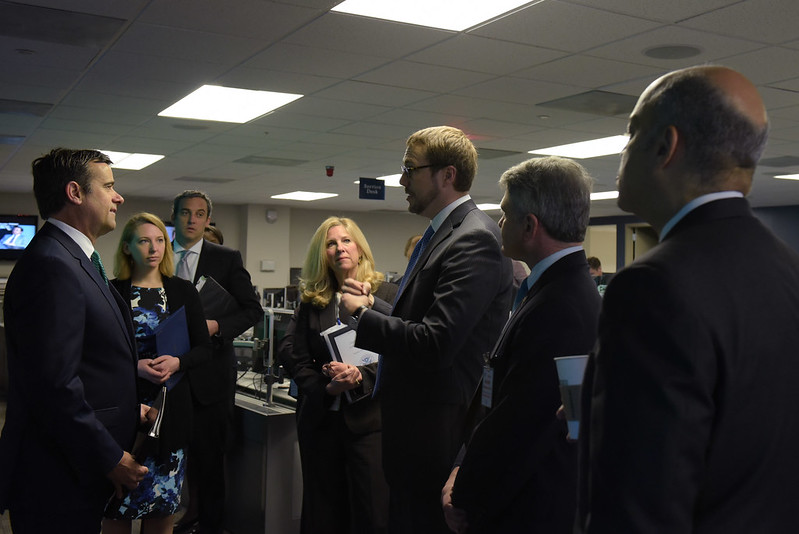Eleven Questions for Director of National Intelligence Nominee Rep. John Ratcliffe
The Senate Select Committee on Intelligence will hold an open hearing on May 5 at 9:30 a.m. to consider the president’s nomination of Rep. John Ratcliffe for director of national intelligence. What should the committee ask him?

Published by The Lawfare Institute
in Cooperation With

Amid questions about the ability of the House and the Senate to function in regular order during a pandemic, the Senate Select Committee on Intelligence will hold an open hearing on May 5 at 9:30 a.m. to consider the president’s nomination of Republican Rep. John Ratcliffe of Texas to serve as director of national intelligence. The hearing will be held in person, not remotely.
The revival of this controversial nomination—which had been announced and then withdrawn last summer—is certain to raise new questions about Ratcliffe’s qualifications and fitness to serve as our nation’s sixth Senate-confirmed director of national intelligence. Those questions will take on fresh urgency in light of recent reporting that the president was repeatedly warned by the intelligence community in January and February about the looming coronavirus crisis.
In our view, the Senate Intelligence Committee is one of the better functioning committees of Congress. The committee—its leadership, its members and the professional staff that support them—has a well-deserved reputation for taking a serious approach to the intelligence and national security matters that fall under its oversight. While not immune to partisanship and partisan conflict, Senate Intelligence Committee deliberations are far less often tainted by those toxic influences than other congressional committees. For example, Chairman Richard Burr and Vice Chairman Mark Warner deserve significant credit for the effort to produce a bipartisan report on the question of Russian election interference. It’s hard to imagine that any other committee of either the House or the Senate could have navigated that particularly treacherous political terrain in such a professional fashion.
The forthcoming Ratcliffe hearings provide the committee with an opportunity to bolster this reputation for seriousness when it comes to national security. To aid in the committee’s efforts, we suggest the following questions for committee members to ask Ratcliffe during the nomination process.
An open hearing for Ratcliffe poses certain constraints, as it will prevent senators from pursuing classified matters. It’s also likely that the nominee will attempt to deflect or parry questions having to do with controversial topics like Russia and election interference, China’s global ambitions and its potential culpability for the coronavirus outbreak, and prospects for rolling back weapons programs in North Korea and Iran. That said, senators can pose an array of questions to Ratcliffe that should elicit a clear picture of his personal qualifications, how he intends to conduct himself in the role of chief intelligence adviser to the president, and how he will communicate with Congress and the public, should he be confirmed.
Our suggested questions include:
1. Why do you think the president nominated you for this position? Why should we feel comfortable that you have the requisite amount of experience? Unlike most Senate-confirmed positions, there is a legal requirement, pursuant to 50 U.S.C. § 3023, that “[a]ny individual nominated for appointment as Director of National Intelligence shall have extensive national security expertise.” All of the previous directors of national intelligence have had significant military, foreign relations and intelligence experience before being nominated. You do not have anywhere near the same depth and breadth of experience. Why is this not a problem, and are you qualified for this job?
2. What is your response to criticism that you have not been particularly engaged with the work of the House Intelligence Committee during your tenure on the committee? When you were first announced as a nominee last summer, congressional and intelligence officials told the Washington Post that as a member of the House Permanent Select Committee on Intelligence, you were “disengaged” from the work of the committee, skipped all but one of the committee's overseas trips last year and “infrequent[ly]” visited the committee's classified reading room. You became known for brief appearances at the business meetings and hearings that the panel often conducts behind closed doors. How would you describe your past participation in intelligence committee work?
3. Do you agree with the president that the intelligence agencies have “run amok”? What does that phrase mean to you? Have you discussed that issue with the president or any of his close aides? Can you share with us the substance of those conversations? Last summer, in defending your initial nomination announcement, the president said, “We need somebody strong that can really rein it in, because as I think you’ve all learned, the intelligence agencies have run amok .... They run amok.” These statements fueled concern that President Trump seeks assessments from the intelligence community that support his own views rather than objective, apolitical assessments to inform good policy decisions. Is that an unfair characterization of the president’s desired relationship with the intelligence community and of his rationale for nominating you as director of national intelligence?
4. Given your past embellishments about your professional accomplishments, how can this committee feel confident that you will be completely forthright and honest with this committee in all matters, and not be inclined to shade the truth? When your nomination was announced the first time last summer, your House website and campaign materials indicated that you had tried suspects accused of funneling money to Hamas. Later, your aide said you had investigated a side issue related to an initial mistrial and did not actually prosecute the case. Your congressional website also said that “[a]s a US Attorney and federal terrorism prosecutor, Ratcliffe put terrorists in prison.” But when asked about this, your office did not provide the names of any terrorism suspects sent to prison as a result of your prosecutorial work. Malcolm Bales, who worked for many years as a prosecutor in the office of the U.S. attorney for the Eastern District of Texas, did not recall a single terrorism prosecution in the Eastern District during your time there. Given this history, will you have the credibility to engage this committee should the Senate confirm you?
5. Do you think it is appropriate to pressure intelligence analysts to come to predetermined conclusions? Will you apply such pressure? If someone else in the administration is pushing the intelligence community to come up with particular conclusions on a topic, how will you react? The Office of the Director of National Intelligence released a statement on April 30 that said that “[t]he Intelligence Community also concurs with the wide scientific consensus that the COVID-19 virus was not manmade or genetically modified.” It also stated that the intelligence community is continuing “to rigorously examine emerging information and intelligence to determine whether the outbreak began through contact with infected animals or if it was the result of an accident at a laboratory in Wuhan.” There have been press reports that the administration has been pressuring analysts, including at the CIA, to search for evidence that the virus came from a Chinese lab and that the World Health Organization helped China cover it up. What is your reaction to these news reports? And how will you handle such pressure should you be confirmed?
6. If confirmed as director of national intelligence, are you prepared in every instance to present to the president and other senior policymakers the consensus intelligence judgments—caveated with dissenting views where appropriate—of the intelligence community professionals you lead? Are you prepared to present these conclusions without any personal contextual comment that might cast doubt on those judgments? In more normal times, this question would not even need to be asked. But as is painfully clear from the tenure of both former Director Dan Coats and former Acting Director Joseph Maguire, bringing unwelcome facts or analysis to this president effectively deals the director out of the president’s circle of trust, if not out of the job completely. Will you commit to this committee that you will give the president the intelligence community’s honest analysis, even when he does not want it and even when doing so erodes your position?
7. Former Director Coats provides an example of a director of national intelligence acting consistent with this principle. One of the reasons Coats inspired confidence on Capitol Hill was that he was willing to speak the truth to the president. For example, when President Trump wanted to negotiate with Kim Jong-Un of North Korea to end its nuclear program, Coats’s and the intelligence community’s assessment was that North Korea would never surrender those weapons. Coats also endured the president’s public criticism of intelligence community officials for their statement, during the 2019 Worldwide Threat Assessment before Congress, that Iran was living up to its commitments under the 2015 nuclear agreement.
He also publicly agreed with the conclusion that Russia interfered in the 2016 election to help candidate Trump. Although that fact about Russian interference is well established, will you say so, publicly knowing that President Trump is likely watching this hearing and may tweet in response to your answer?
8. Do you think former Intelligence Community Inspector General Michael Atkinson faithfully discharged his legal obligations as an independent and impartial inspector general? Would you support an inspector general who offered independent and impartial analysis, even if that analysis showed the president or his associates in a bad light? On April 3, President Trump removed Atkinson from his role as inspector general of the U.S. intelligence community. Atkinson subsequently released a statement announcing that he believed the president dismissed him because he had faithfully discharged his legal obligations as an independent and impartial inspector general. In your view, did Atkinson behave appropriately and was it appropriate for the president to remove him?
9. Describe for the committee your vision of the director of national intelligence’s role in managing and leading the 16 intelligence organizations that compose the intelligence community. What do you see as the most salient threats to the U.S.’s national security, and what is your vision for the role of the director of national intelligence in addressing those threats?
At various points during this administration, there has been speculation that some presidential advisers question whether a director of national intelligence is even necessary. While there is always room for reasoned debate about how effectively and efficiently the Office of the Director of National Intelligence is performing its statutory duties, that conversation should be premised on the idea that the bipartisan intelligence reform project pursued in the wake of 9/11 has helped make the nation safer than it otherwise would have been. How expansive or narrow a role for the director of national intelligence do you envision? Did the Intelligence Reform and Terrorism Prevention Act of 2004 (IRTPA) go too far or not far enough? What kind of director of national intelligence do we need to cope with both familiar and emerging national security challenges?
More broadly, the intelligence community has great capacity to collect information about the political dynamics of adversaries and military capabilities. But it may lag in its understanding of broader threats, like pandemic disease and climate change, as well as technological developments, like the use of social media and artificial intelligence, that will pose challenges to national security going forward. How should we best position the intelligence community over the longer term? What potential investments in new capabilities to address these broader threats would you support?
10. Will you commit to hold in front of this committee and other relevant committees of jurisdiction an annual open and public hearing to review the range of threats to U.S. national security? The annual Worldwide Threat Assessment testimony provided by the director of national intelligence and other intelligence chiefs has become a critical opportunity for the intelligence community to speak to the American people and audiences around the world about the array of national security threats facing the United States. When that set of hearings was canceled earlier this year, there was reporting that the Office of the Director of National Intelligence sought to avoid provoking the president with public testimony on issues where intelligence community judgments either run counter to Trump’s own unorthodox views or could imply that policies being pursued by the administration are unlikely to succeed. Regardless of whether the reporting was accurate, will you commit to participating in this annual exercise? The president may be the first customer for the intelligence community, but he is not the only customer. Congress and the American people deserve to hear what the intelligence community believes is true about national security threats, even if those judgments are at odds with the president’s policy preferences. Do you agree?
11. Finally, do you subscribe to the notion that there is a deep state of intelligence and national security professionals motivated by animus to President Trump seeking to undermine both him personally and the policy objectives of his administration? Will you explicitly reject that notion today in front of this committee and the American people? Again, in normal times, this is not a question that would need to be asked. But the women and men of the intelligence community are entitled to know if the man the president has selected to lead them and to speak their collective truth actually views them as the dedicated, nonpolitical professionals that we know them to be. Our intelligence professionals deserve a leader who believes in them and in their work. Will you give a commitment to reject swiftly and publicly any statement from any quarter, including from the White House, that suggests such a conspiracy?
***
Regardless of whether Ratcliffe is confirmed, the intelligence community, its leadership and its relationship with Congress are at an inflection point. The administration has purged leaders (like Coats, Deputy Director of National Intelligence Sue Gordon and Maguire) and an independent inspector general willing to speak truth to power and execute their duties with integrity. Permanent politicization of the intelligence community is on the table right now. Congress should remember its institutional responsibility to ensure the apolitical excellence of the intelligence community, as well as its institutional prerogative to reject nominees who are not up to snuff.




.jpg?sfvrsn=1111cf9d_4)
